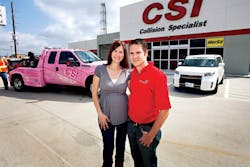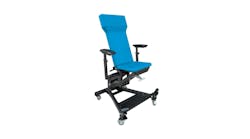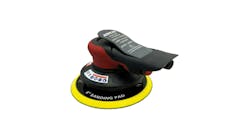Sometimes it takes a disaster to make change happen.
In the case of Houston body shop Bear Creek Collision Specialist Inc., it took a category 4 hurricane.
In September of 2008, Hurricane Ike ripped through what was thought to be the safest space in the multi-building facility. Walls collapsed, garage doors blew away and debris rained on 36 customer vehicles jammed into the 6,000-square-foot shop for safety.
The storm caused roughly $750,000 worth of building damage and an additional $200,000 of vehicle damage. For shop manager Trey Perdue’s father, the shop’s longtime owner, it was too much. After a family discussion about how to move forward, it was decided that Trey’s wife, Cheryl Perdue, who managed the shop’s books and co-owned the family wrecking company, would take over as the collision center’s owner. Trey would continue in his hands-on role as general manager.
“The torch was handed to us in the middle of utter chaos and confusion,” Cheryl recalls.
But the Perdues envisioned what the business could become. Pursuing their dream of a one-stop auto service complex that would speed the claims process, they invested $1.5 million—much of it from the business’s cash flow—in new construction, partnered with other auto businesses, renegotiated with long-ignored vendors, ditched their DRP strategy, and revamped their customer service approach. Along the way, they switched to waterborne and invested in a host of eco-oriented features.
The reborn 28,000-square-foot shop, which looked as if it might never reopen after the hurricane, now sees 250 cars a month and takes in about $6 million in annual revenue. And the Perdues aren’t done chasing their dream.
Out of the storm and into the fire
If there was ever any doubt the Perdues weren’t up to the task of running Bear Creek CSI, it was erased in the days immediately following Hurricane Ike.
Rather than tend to their nearby home, they rallied employees, hired temporary staff, gathered up five generators and went to work getting their shop operable. They were fixing cars within a day—and they had plenty to fix.
“Even though no businesses were open, we were determined to be open because, you know, people want their cars,” Cheryl says.
At the same time, they started looking into construction options and planning for what they envisioned to be a full-service auto mall. The plan: Include everything needed for car repairs on the business’s single 8.5-acre lot, from body and mechanical service to accessory shops and car rentals. They also wanted to make the shop more financially efficient, boost its customer service and reduce its impact on the environment.
The couple faced a steep climb, especially since they were starting with a beat-up facility running off generators.
“This was probably the most stress I’ve ever dealt with in my life and it was very frustrating,” Cheryl says. “But you just keep moving. You find a way to survive and just get through it.”
To accomplish their goals, they did the following:
Took risks. Investing in a new facility and business model in a down economy took some nerve, Cheryl admits, though she and Trey examined the worst-case scenarios to make sure they could survive financially if the business failed.
To make matters worse, the center’s insurance company didn’t want to pay the damage claim and the Perdues had to make their investments using business cash flow and bank loans. Insurance did eventually cover all damages.
“There was a lot of risk involved and that was making me scared,” she says. “You have to have some exit strategy and know where your limits are.”
Ensured they had proper insurance coverage. Making sure the shop was properly insured was important in getting reimbursed for damages, Cheryl says.
In the event of a disaster, she says shops should document damage with photos and keep a record of conversations with insurance claims representatives. Shops also need to understand exactly what is covered under their policy.
“We educate our customers on how to handle a claim and when we are involved in a claim ourselves, we essentially take our own advice,” Cheryl says.
She says shop owners should talk to insurance agents about their coverage needs and shop for the best rates each year.
“It is a pain, but can save thousands off the bottom line,” she says.
Renegotiated with vendors. Cheryl said this hadn’t been done in many years. She and Trey evaluated every vendor relationship and renegotiated everything. Some vendors were dropped; others lowered their prices to maintain the relationship.
“I’ve always been a firm believer in making people fight for my business,” Cheryl says.
Partnered with auto-related businesses. The new Bear Creek facility features three buildings on the front parcel, designed to house the front office and other businesses related to auto repair.
Hertz car rental and a local glass company each have space in the main office, and a tire company occupies one of the other buildings. The third space is vacant; the Perdues hope to fill it with an auto accessories or specialty business. Bear Creek also has a mechanical shop onsite. So far, each of the segments has worked well together.
“It adds to the efficiency of getting cars in and out really quickly,” Cheryl says.
Researched and revamped customer service. After taking over the business, the Perdues started sleuthing at other body shops to see what they liked and didn’t like from a customer’s point of view.
Cheryl says she was shocked at how long she waited for an estimate at some shops, and how she felt ignored by busy estimators.
To solve that problem at Bear Creek, the Perdues moved the estimators who were already working on an order to the back of the office.
Only available estimators are allowed in the lobby. Front office employees are also fluent in English and Spanish, which is important in Houston.
The front office at Bear Creek was designed to feel comfortable and homey, so customers don’t feel like they’re at a body shop. Cheryl says they strove to make it a place where a mother would feel comfortable taking her kids.
Customer service is so important at Bear Creek that the company structures bonuses for its 45 employees based on customer satisfaction surveys. Customers also get individual follow-up phone calls after repairs.
Split from the competition. Consolidation is a growing reality in the Houston area. Trey says Bear Creek was a DRP-driven shop for 15 years before the hurricane, but when big competition started encroaching on those relationships, he and Cheryl decided not to compete in that realm. Instead, they simply focus on being the best at what they do.
“If you see that you’ve got conglomerates coming into the area and they want to squish you, try to get on the other side,” Cheryl says. “Don’t try to compete head-to-head. If all of them want to make concessions to the insurance companies, you do the opposite.”
Invested in eco-friendly strategies. Helping Mother Nature is a priority for the Perdues.
Using a company called Native Energy, they calculate the shop’s carbon footprint and come up with how much they would need to pay toward renewable energy projects to offset it. They pay that difference monthly, putting the money toward renewable energy projects.
The shop also sprays PPG waterborne paint and features an in-ground water skimmer that captures soapy water before it runs into the soil.
Invested in humanitarian efforts. Their wrecker truck is painted pink for breast cancer awareness and a portion of every tow goes to the local chapter of the American Cancer Society.
A vision realized
It’s only been three years since Hurricane Ike, but Bear Creek’s transformation is nearly complete.
Trey says he and Cheryl hope to fill the vacant building this year and maybe add classic restoration to their offerings. They also plan to start repairing heavy equipment, like buses and motor homes.
So far, their investments are proving to be wise ones. Customer traffic is not as high as it was pre-hurricane, but gross profit margins are up to 43 percent from 34 percent, and cycle time is noticeably down. The Perdues expect stronger growth as more people get to know the new Bear Creek.
“You can’t control the weather,” Cheryl says. “These days you can’t control anything but yourself. We just started to do things to make us the best body shop in town.”




